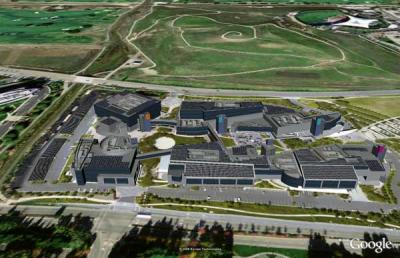With Whole Foods going 100% wind (by using green tags), and many other companies following suit, as well as some government agencies, its no wonder that Google would go solar.
I would imagine that Google uses a shit-tonne (that being more than a butt-load, and less than a ho-billion) of electricity could really use a large 1.6 MEGAwatt installation.

From here
Google Inc. plans a solar-powered electricity system at its Silicon Valley headquarters that will rank as the largest U.S. solar-powered corporate office complex, the company said on Wednesday.
The Web search leader said it is set to begin building a rooftop solar-powered generation system at its Mountain View, California, headquarters capable of generating 1.6 megawatts of electricity, or enough to power 1,000 California homes.
“This is the largest customer-owned solar electric system at a corporate site,” said Noah Kaye, director of public affairs at the Solar Energy Industries Association, an industry group based in Washington, D.C.
A Google executive said the company will rely on solar power to supply nearly a third of the electricity consumed by office workers at its roughly one-million-square-foot headquarters. This does not include power consumed by data centers that power many of Google’s Web services worldwide, he said.
You can watch a video of the potential installation here.
A little run down of the system from the designers website shows the system stats as the following.
Location:
Mountain View, CaliforniaSystem Size:
1.6 MW
Energy Output:
2,611,719 kWh per year
Savings:
$393,000 + annually
Results:
C02 emissions reduced by 3.6 million pounds/year (equivalent to 4.28 million car miles/year)
Read the PDF stat sheet here.
The payback on a system of this size is amazingly fast.
By building the largest solar power system ever installed at a single corporate campus, Google will save more than $393,000 annually in energy costs — or close to $15 million over the 30-year lifespan of its solar system. At this rate, the system will pay for itself in approximately 7.5 years.
Lets hope this inspires other tech giants to start doing the same.
5 thoughts on “Google Goes Solar”
Comments are closed.